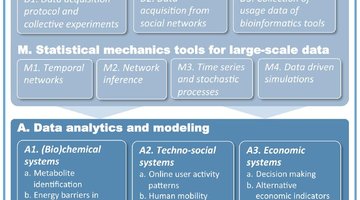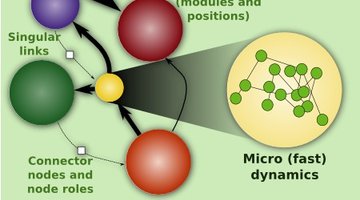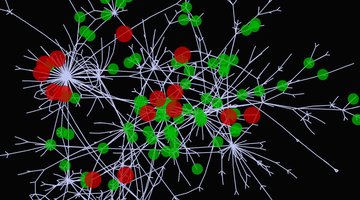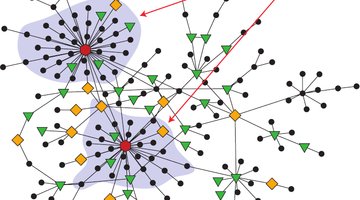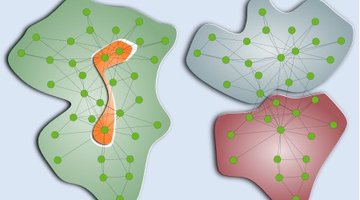GRANTS
Statistical physics of network inference for interpretable machine learning
Networks are representations of systems whose constituent parts interact with each other in non-trivial ways. They are used to model a wide range of complex systems, including physical, chemical, biological, transportation, and social systems. Within this context, network inference is the process of inferring the underlying structure or underlying properties of a network from observational data. The goal of network inference is to reconstruct the underlying network from data and to identif...
Física estadística de selección y validación de modelos para datos complejos
At least since the scientific revolution, interpretable mathematical models have been instrumental for advancing our understanding of the world. The “big data” era held the promise of facilitating the discovery of similarly interpretable mathematical models of natural and socio-economic systems that were previously not amenable to quantitative analysis. Yet, so far we have not seen such an explosion of new interpretable mathematical models. This is in part because machine learning models a...
Modelitzacio probabilística per a predir l'evolució de la COVID-19: parametrització i correcció automàtica
The project aim to develop an intelligent epidemiological assessment and prevention system that combines the processing of data on human activity, interaction and mobility, epidemiological and clinical data related to COVID-19, and the mathematical modeling that uses this data to calculate the probabilities of epidemic risk and effective reproductive number in Catalonia and Spain. This system initially integrates the different scales of interaction and mobility of each age group, each stag...
Data science of judicial decisions for evidence-based housing policies in Spain
Housing the most vulnerable is an explicit societal pillar of the European Union since 2017. In Spain, the lack of reliable sources of housing-related data is causing erratic and contradictory judicial decisions with devastating consequences for hundreds of thousands of families. This project seeks to analyze systematically through data science tens of thousands of housing-related court decisions (such as evictions, abusive clauses, or squatting) before and after the beginning of the housi...
Statistical Mechanics for Modeling and Prediction of Human Behavior
StatMech2Pred is an ambitious project which intends to understand human behavior at individual and society scales by developing new prediction and observational techniques based on statistical mechanics. During the past 15 years we have witnessed a remarkable increase in both the scale and scope of social and behavioral data available. Such wealth of data has not only opened the possibilities to understand social systems in an unprecedented manner but also has also emphasized the need for ...
OnADA: Online Automatic service for Data Analytics
Problema a resoldre
Extreure valor a partir de l’anàlisis de les dades continua essent, avui més que mai, l’autèntic coll d’ampolla tecnològic vinculat al paradigma Big Data. La facilitat actual a l’hora de generar, transmetre i emmagatzemar grans volums de dades no es correspon amb la capacitat real de tractar i extreure informació d’interès mitjançant l’ús de mètodes d’anàlisis cada cop més sofisticats. Calen doncs mètodes d’anàlisis potents que aportin insight d’interès als propi...
Statistical Mechanics for Big Data: acquisition, analysis and modeling
Technological advances during the last fifteen years have boosted our capacity to generate and store data. Indeed, according to some estimates 90% of the world’s stored data has been generated in the last two years, and the availability of such large quantities of data is changing the way we face crisis response, social mobilization, marketing, and intelligence. In science, the hopes created by big data are also high, and analyses of large datasets are behind recent breakthroughs in areas ...
Discovery, decomposition and dynamics of complex networks
Recent technological advances have boosted our ability to gather information on a variety of complex processes occurring at scales from the cellular to the planetary. At a cellular scale, the number of unicellular organisms whose genome has been completely sequenced has grown exponentially in the last few years. For each of these organisms, we know with remarkable accuracy the exact sequence of nucleotides in their DNA-in other words, we know their bio- chemical "blueprint." Unfortunately,...
Multiplex: Foundational Research on MULTI-level comPLEX networks and systems
Many artificial and natural systems are characterized by a high level of differentiation in structure and organization; they exist in areas as diverse as the Internet, energy management, climate, financial markets, infrastructures (including ICT), biology, transport, epidemics, meteorology, urban planning, social simulation and policy impact assessment. In order to describe and control these systems there is a need to observe and reconstruct their dynamics and make sense of large amounts o...
Inferencia estadística para el análisis de perturbaciones sistémicas en redes complejas
System-wide disturbances that result from seemingly small perturbations are widespread, important and, in general, poorly understood. Consider, for example, how ingestion of a small amount of certain chemicals can trigger systemic physiological changes leading to disease; or how bankruptcy of a few companies can trigger a global economic crisis.
The challenges involved in understanding these processes arise from the properties of the systems in which they take place. Indeed, these s...
Group-based Dynamics on Complex Networks
Cells, ecosystems and economies are examples of complex systems. In complex systems, individual components interact with each other, usually in nonlinear ways, giving rise to complex networks of interactions that are neither totally regular nor totally random. Partly because of the interactions themselves and partly because of the interaction topology, complex systems cannot be properly understood by just analyzing their constituent parts, which poses important challenges from both a funda...
Decomposition and Discovery of Complex Networks
In complex systems, individual components interact with each other often in non-linear ways via a non-trivial network of interactions. The structure of such network of interactions affects that system's dynamics and conveys information about the functional needs of the system, its evolution, and the role of individual units. For these reasons, network analysis has become a cornerstone of fields as diverse as systems biology, economics and sociology. In these fields, the advance of technolo...
Statistical inference for complex network discovery and feature extraction
In complex systems, individual components interact with each other giving rise to complex networks of interactions that are neither totally regular nor totally random. Although during the last decade significant progress has been made in the study of complex networks, we are still far from the ultimate goals of: (i) characterizing real-world complex networks; (ii) understanding the precise mechanisms responsible for the observed topology; and (iii) evaluating the impact of the structure of...






